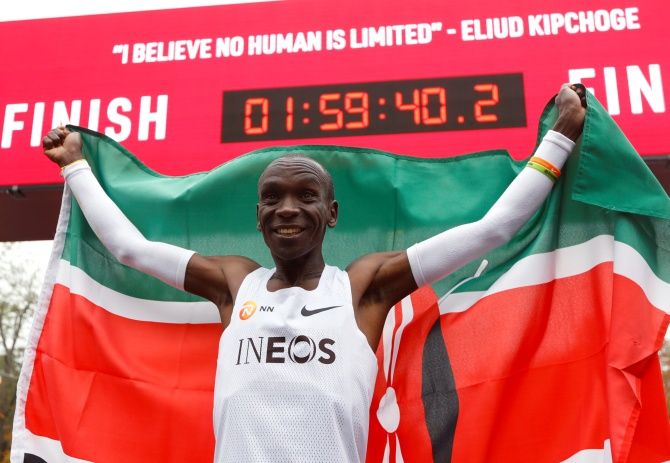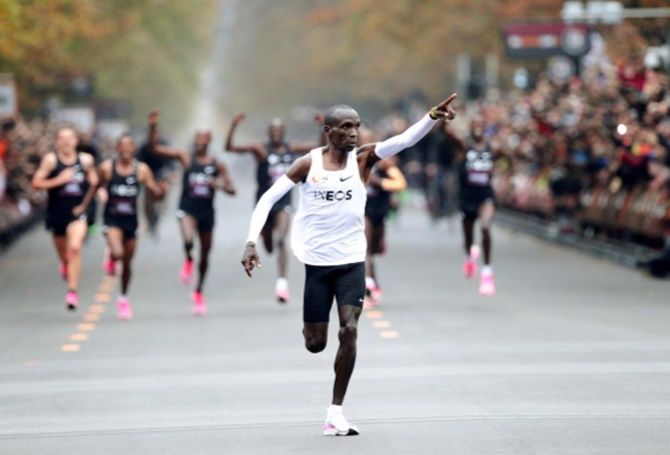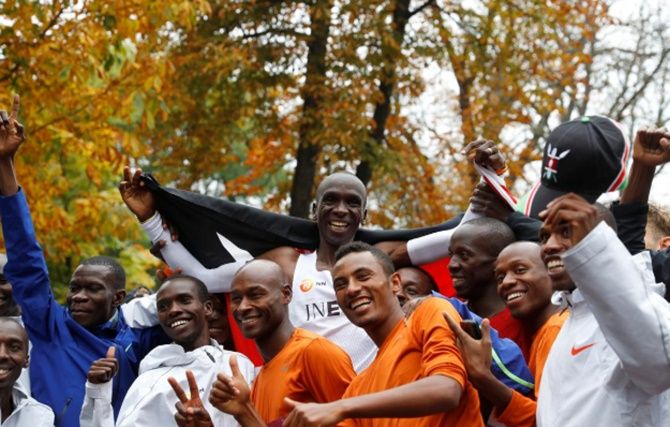Eliud Kipchoge's story is unusual because when he came into competitive running it was not in the marathon.
Fortunately for himself and the rest of us, he then turned to the marathon.
Aakar Patel salutes the great runner's incomparable spirit.

The Kenyan runner Eliud Kipchoge has become the first person to run the marathon in under two hours. He did this at an event in Austria, which other runners thought was the greatest exploit in their sport.
Commentators, who were former distance runners themselves, said this feat was akin to the man landing on the moon. I thought at first that this was stretching it, but perhaps it isn't.
Kipchoge ran the event by himself in full, but there were pacers helping him along.
This was a phalanx of half a dozen men who were positioned just in front of him to maximise the slipstream and minimise wind resistance.
There were also two men just behind him, perfecting the aerodynamic flow.
The men in front were running to the pace of a laser light that was being shot out of a car ahead, a green beam across the road which they had to keep up with in order to beat the two-hour mark.
Other than the pacers, and the fact that he was the only one actually running the full distance there was one other thing that disqualified this event from being an official record.
This was the fact that Kipchoge did not have to pick up his drink from tables, but were brought to him by a cyclist.
But even with these things aiding him, and the fact that this would not be considered a record, the experts were ecstatic that he was able to achieve it.

Kipchoge's story is unusual because when he came into competitive running it was not in the marathon, which is actually a highly specialised and extremely technical event.
He ran much shorter distances in his first Olympics and only turned to the marathon when he couldn't make the cut (by his standards, that is: He won the Olympic bronze in the 2004 Athens Games for the 5,000 metre race and the Olympics silver for the same event at Beijing 2008).
Fortunately for himself and the rest of us, he then turned to the marathon. This is the Olympic event with the most interesting history.
The first marathon was run by the Athenian courier Pheidippides. He was carrying news of the 'magnificent victory' -- the Greeks tended to exaggerate their exploits against the Persians, who were a disproportionally greater power for much of the ancient world -- against a fleet sent by Darius.
This fleet was defeated at Marathon and Pheidippides set off with news of the victory, running to Athens, a distance of some 25 miles (about 42 km).
It is not known how long he took to cover this distance but the young man arrived exhausted, announced the news, and died. This happened about 500 years before Christ.
The modern marathon race at the Olympics began as a recreation of this 'epic' event (Europeans dominated everything in those days as they tend to do today too).
The race was only for men and usually finished just under three hours with plenty of accusations of doping, helping and short-cutting.
Meaning that Kipchoge ran the race an hour faster than the runners of a century ago. His speed can be understood by others who can travel at 21 kmph.
I usually do weekend rides on my bicycle to the airport, which is a little more than 63 km. My total time spent doing this is about three hours.
So I go at an average of exactly the same speed as Kipchoge runs, but on a super-light bicycle. I am knackered by the time I return.
I am almost 50 and not in the best shape, but I put what I can into the riding and can easily keep up with people half my age or younger.
To me the idea that someone can run at that same speed is mind-boggling and incomprehensible.
Those of you who are interested in this further can search for YouTube videos where people try to emulate Kipchoge's speed on the treadmill. Few can run even for a minute at that pace.

Kipchoge is the holder of the official marathon record too, which stands at a minute over two hours.
This is astonishing because with all of the assistance he received in Austria in the unofficial attempt, he was only able to shave off just a second or so more per km over two hours.
It means that the people who run these races are running at the absolute edge of human performance for more than 120 minutes.
The top 10 male marathon runners in the world ever are either Kenyan or Ethiopian. Among the women the top nine are from these two nations.
Clearly, there is something about these two places, the legacy of running, the quality of training, the physical build and so on which has meant total domination over the rest of the world.
I wonder how long we humans will still be astonished by sporting achievements. Will such events exist in 10 years's time and will former athletes gasp at new timings? For some reason I doubt it.
Modern science and engineering and genetics are adding an edge to what we humans can achieve at a rapid pace.
We will no longer be able to marvel at people's ability to run, throw, swim and jump.
That will be a shame in one sense, but it will mark the arrival of a brave new world in another.













 © 2025
© 2025